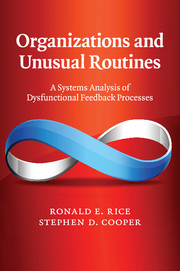Book contents
- Frontmatter
- Contents
- List of figures
- List of tables
- List of boxes
- Preface
- Acknowledgments
- 1 Crazy systems, Kafka circuits, and unusual routines
- 2 Causes, symptoms, and subroutines of unusual routines in six computer information/communication systems
- 3 Getting personal: unusual routines at the customer service interface
- 4 A multi-theoretical foundation for understanding unusual routines
- 5 A detailed case study of unusual routines
- 6 Summary and discussion of the case study results
- 7 Individual and organizational challenges to feedback
- 8 A multi-level and cross-disciplinary summary of concepts related to unusual routines
- 9 Recommendations for resolving and mitigating unusual routines and related phenomena
- 10 Summary and a tentative integrated model of unusual routines
- References
- Index
9 - Recommendations for resolving and mitigating unusual routines and related phenomena
Published online by Cambridge University Press: 10 January 2011
- Frontmatter
- Contents
- List of figures
- List of tables
- List of boxes
- Preface
- Acknowledgments
- 1 Crazy systems, Kafka circuits, and unusual routines
- 2 Causes, symptoms, and subroutines of unusual routines in six computer information/communication systems
- 3 Getting personal: unusual routines at the customer service interface
- 4 A multi-theoretical foundation for understanding unusual routines
- 5 A detailed case study of unusual routines
- 6 Summary and discussion of the case study results
- 7 Individual and organizational challenges to feedback
- 8 A multi-level and cross-disciplinary summary of concepts related to unusual routines
- 9 Recommendations for resolving and mitigating unusual routines and related phenomena
- 10 Summary and a tentative integrated model of unusual routines
- References
- Index
Summary
Based upon the analyses and reviews of the prior chapters, this chapter provides some recommendations (Box 9.1) for how to increase awareness of, attention to, discussion about, and resolution of factors and contexts that encourage unusual routines and related problems.
Encourage customer service feedback from all stakeholders
The literature on ways to strengthen customer satisfaction is vast. Jones and Sasser (1998, p. 19) suggest several approaches to continually monitor and improve customer service. These include:
(1) embed customer satisfaction indices (measure over time, and type of product/service, or customer);
(2) seek feedback through multiple channels and content (comments, complaints, questions);
(3) conduct market research (both before people become customers and when they defect);
(4) train, empower, and support frontline personnel to better listen to customers and to forward the problems and solutions to the organization; and
(5) develop strategic activities involving customers in the business.
Wexler et al. (1993) provide detailed recommendations of ways to instill and improve service quality, in the areas of service zones, integrating service and selling, encouraging demanding customers, nurturing complaining customers, managing recoveries from service problems or failures, generating moments of positive and negative experiences as well as truth, grounding the organization in vision and values, implementing a quality service change effort, and managing the people systems that provide the foundation for all the service components.
Information
- Type
- Chapter
- Information
- Organizations and Unusual RoutinesA Systems Analysis of Dysfunctional Feedback Processes, pp. 306 - 330Publisher: Cambridge University PressPrint publication year: 2010
